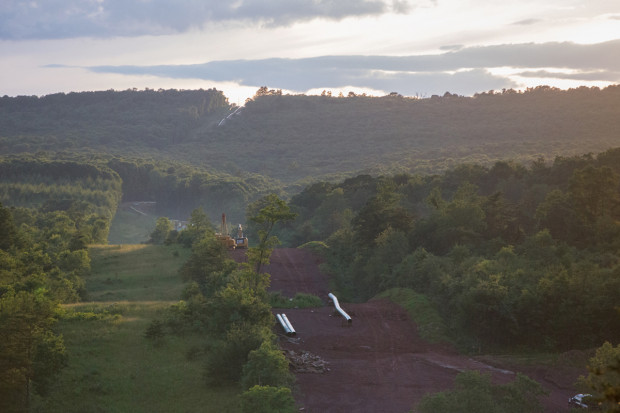Plaintiffs ask judge to revoke ‘illegal’ Mariner East 2 permits
-
Jon Hurdle

Lindsay Lazarski / WHYY
Construction of the Mariner East 2 pipeline in Huntingdon County, Pennsylvania. Environmental groups have asked a judge to revoke the permits issued by DEP to Sunoco.
Three environmental groups urged a judge to revoke some environmental permits for the Mariner East 2 pipeline without holding a trial, saying there are ‘undisputed’ facts showing that the Pennsylvania Department of Environmental Protection broke the law in issuing the permits.
Clean Air Council, Delaware Riverkeeper Network and the Mountain Watershed Association filed a motion for summary judgement with Judge Bernard Labuskes of the Pennsylvania Environmental Hearing Board late Friday as part of their appeal against issuance of the permits.
The groups say there is a set of facts in the case that are not in dispute and which make the case suitable for a judge to rule on without holding a full trial to hear the opposing arguments by Sunoco Pipeline and the DEP.
The plaintiffs are asking the board to revoke Chapter 102 and 105 water-quality permits on the grounds that the pipeline would violate state law by crossing “exceptional value” wetlands unnecessarily; that it violated anti-degradation law for those wetlands, and that DEP issued permits without receiving a storm water management plan from Sunoco.
The motion accuses DEP of breaking the law by allowing Sunoco to build the pipeline across the wetlands which are not a permitted location for pipelines unless the operator can show that it needs to build there for the basic purposes of the project. Mariner East 2 is not “water dependent as therein defined, yet the Department permitted Sunoco to encroach on exceptional value wetlands,” the motion says.
It also says the permits are “unlawful and arbitrary” because DEP failed to identify the existing uses of exceptional value wetlands where the pipeline is being built.
DEP issued final permits that allowed construction to begin in February this year even though deficiencies remained in Sunoco’s permit applications. The pipeline, costing more than $2.5 billion, will carry propane, ethane and butane some 350 miles from the Marcellus Shale of southwest Pennsylvania to an export terminal at Marcus Hook near Philadelphia.
The project is scheduled for completion by the end of 2017 but may be delayed after the Public Utility Commission on Oct. 26 halted construction of a valve in Chester County’s West Goshen Township amid the township’s claims that Sunoco violated a settlement agreement on the siting of the valve.
The summary judgement motion sets out 20 “undisputed material facts” about the case which it says support the argument that the board should rule without a trial. The list includes the fact that the pipeline crosses 139 wetlands that meet at least one requirement to be classed as “exceptional value,” and that Sunoco gave some of the wetlands that designation.
According to the facts list, neither Sunoco nor the Department conducted an alternatives analysis that reviewed environmental features outside a 200-foot survey “corridor,” and neither considered alternative means of carrying natural gas liquids such as trucks and trains.
During construction, there have been spills of drilling mud – known as inadvertent returns – into wetlands that are classified as exceptional value because of the presence of bog turtles and trout, the plaintiffs’ list says.
Both a DEP spokesman and Sunoco’s Jeff Shields say they do not comment on pending litigation.
Alex Bomstein, an attorney for Clean Air Council, would not say whether the motion for summary judgement was always part of the plaintiffs’ strategy for appealing the permits, but said the motion contains material that was obtained during the discovery phase of the litigation.
Bomstein predicted that the judge would rule on the motion in about two months’ time, after hearing responses from DEP and Sunoco.
The arguments for summary judgement were among those made by the plaintiffs in their initial appeal to the EHB, and they have now been strengthened, Bomstein said.
“The motion for summary judgement is where we have made these arguments the strongest,” he said.
















